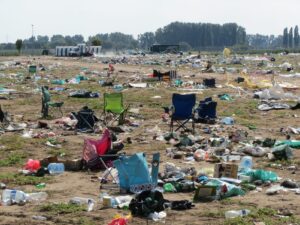The Dark Side of Celebration: How Festivals Harm the Environment
The Dark Side of Celebration: How Festivals Harm the Environment

Celebrations and festivals are deeply woven into the fabric of human culture, fostering community spirit, providing entertainment, and preserving traditions. However, these events often cast a long shadow on the environment, leading to pollution, waste generation, and resource depletion. Acknowledging and actively mitigating these impacts is crucial for ensuring that our celebrations align with the principles of sustainability, allowing us to enjoy them without compromising the health of the planet.
Pollution is a major environmental concern during celebrations and festivals.
Air Pollution: The crackle and boom of fireworks, often a centerpiece of celebrations, release a cocktail of harmful pollutants into the atmosphere. Particulate matter (PM10 and PM2.5), sulfur dioxide ($SO_2$), and heavy metals like strontium and barium contaminate the air, contributing to respiratory problems and exacerbating existing air quality issues. For instance, during Diwali in India, the widespread use of fireworks leads to a dramatic spike in air pollution levels, with some cities experiencing air quality indices several times higher than the safe limit.
Noise Pollution: The din of loud music, firecrackers, and bustling crowds can create significant noise pollution. Prolonged exposure to high noise levels can lead to hearing damage, stress, and sleep disturbances in humans. Wildlife is also affected, as noise pollution can disrupt animal communication, breeding patterns, and foraging behavior.
Water Pollution: Improper waste disposal, chemical release from decorations, and inadequate sanitation facilities can contaminate water sources. The immersion of idols during religious festivals, a common practice in many cultures, can introduce pollutants into rivers and lakes. These idols are often made of non-biodegradable materials and painted with toxic dyes, which can leach into the water and harm aquatic life.
Celebrations and festivals are often synonymous with excessive waste generation.
Food Waste: Large quantities of food are prepared and served, leading to significant leftovers. Much of this food waste ends up in landfills, where it decomposes and releases methane, a potent greenhouse gas that contributes to climate change.
Plastic Waste: The convenience of disposable plates, cups, and cutlery contributes to a surge in plastic waste. Plastics persist in the environment for hundreds of years, polluting ecosystems and harming wildlife. Marine animals often ingest plastic debris, leading to starvation and death.
Decorative Waste: Decorations, banners, and other event-related materials, often made of non-recyclable or non-biodegradable materials, add to the waste stream. After the festivities, these items are often discarded, contributing to landfill overflow.
Organizing celebrations and festivals requires significant resources, including energy, water, and raw materials. As a result, it is depleting the Planet’s resources.
Energy Consumption: Lighting, sound systems, transportation, and other event-related activities consume vast amounts of energy. This energy consumption often relies on fossil fuels, contributing to greenhouse gas emissions and climate change.
Water Usage: Water is used for drinking, cleaning, and sanitation purposes. Excessive water consumption can strain local water resources, especially in regions facing water scarcity.
Raw Materials: The production of decorations, costumes, and other event-related items requires raw materials like paper, plastic, and textiles. This extraction and processing of raw materials can lead to deforestation, habitat destruction, and resource depletion.
To minimize the environmental impact of celebrations and festivals, we must adopt sustainable practices.
Reducing Pollution
- Eco-friendly fireworks: Opt for fireworks that produce less smoke and contain fewer harmful chemicals.
- Public transportation: Encourage the use of public transportation, carpooling, and cycling to reduce vehicle emissions.
- Noise reduction: Implement noise reduction measures, such as setting volume limits and using noise barriers.
Minimizing Waste
- Reduce food waste: Plan food quantities carefully, donate leftovers to food banks, and compost food scraps.
- Reusable tableware: Use reusable plates, cups, and cutlery instead of disposable items.
- Recycling programs: Implement effective recycling programs to collect and process recyclable materials.
Conserving Resources
- Energy-efficient lighting: Use LED lighting and other energy-efficient technologies.
- Water conservation: Implement water conservation measures, such as using low-flow fixtures and collecting rainwater.
- Sustainable materials: Source sustainable materials for decorations, costumes, and other event-related items.
Engaging the community and raising awareness about the environmental impacts of celebrations and festivals is crucial for fostering sustainable practices. For this-
- Educational campaigns: Conduct educational campaigns to inform event organizers, participants, and local residents about the importance of reducing waste, conserving resources, and minimizing pollution.
- Community involvement: Encourage community involvement in cleanup efforts, tree planting initiatives, and other environmental projects.
- Promote eco-friendly practices: Encourage participants to adopt eco-friendly practices, such as bringing their own water bottles and using reusable bags.
Our celebrations should uplift,
not burden, the earth.
True celebration honors
both community and the environment.
Celebrations and festivals are an integral part of human culture, but their environmental impacts cannot be ignored. By understanding the sources and consequences of pollution, waste generation, and resource depletion, we can implement strategies to mitigate these effects and promote sustainable celebrations. Through community engagement, education, and responsible event management, we can ensure that celebrations and festivals bring joy and unity without compromising the health of the planet. By embracing sustainable practices, we can transform our celebrations into opportunities to honor both our traditions and the environment.
